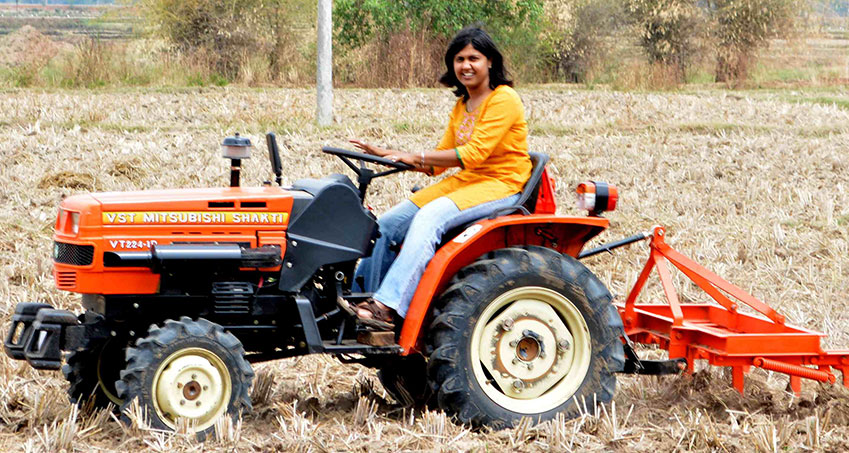Devi Murthy – An Engineer Changing the Lives of Small Farmers in India through ‘Kamal Kisan’

Success comes to those who have the guts to take the untrodden path.
This is exemplified by many successful women who defied society and conquered areas otherwise considered male dominated. This series celebrate all such women who did the unthinkable and made us proud!
Devi Murthy- From Electrical Engineer to Entrepreneur with a Social Impact
Devi Murthy, an electrical engineer from Drexel University, uses technology to lessen the struggles of small farmers in India. She has set out to help Indian farmers with her cool new start up called Kamal Kisan, a for–profit social enterprise by manufacturing low cost mechanisation equipment.
Devi worked with Philadelphia Water Department and PJM Interconnection before joining the family business, Kamal Bells, manufacturers of automotive equipment for 5 years as a product development engineer. She wanted to combine her knowledge of machines and have a social impact as well. While doing masters in entrepreneurship from Indian Institute of Management, Bangalore, she was suggested by a classmate over a cup of chai that she could help the Indian farmers. It took Devi ‘a good 2 years of market research’ before she went ahead with the idea. According to her, there is a lack of empathy for the small farmers in India which compelled her to work towards helping them improve their farm productivity and ultimately their lives.
Founding Kamal Kisan
Kamal kisan was founded at the IIT Madras’ incubation cell that recognised Devi Murthy’s ideas as innovative and provided a seed fund of INR 5 lakh.
A team comprising 6 people, from different fields such as engineering, marketing and agriculture came together to work on this new idea . Karan Patel, a mechanical engineer and product designer and Bhargavi Vijayakumar, a qualified Cost Accountant and a business consultant have been the backbone of this venture. Kamal Kisan is working towards providing “mechanisation solutions for people who own less than 5 acres” on a rental basis. Agricultural equipment targeted for small farmers are different from the machines like tractors and harvesters already available in the market, they are meant for large farms and are ineffective when the size of the holding is less than 5 acres. These equipment are being made keeping in mind the requirements of the small farmers in rural India with efforts towards making the farmer’s labour more efficient , productive and profitable. They aim at reducing dependency on labourers and fuel, the two main contributors to high cost incurred by small cultivators.
Helping Farmers of Karnataka
Murthy is aiding farmers in rural areas of Karnataka, especially areas such as Suttur and HD Kote. Murthy and her team go down to the village fields to tests their equipment and test how well the machines work.
Murthy laughs and says in her various interviews that the farmers are very intrigued when they see her, an educated city girl working on the fields and they usually come up to her and ask what she is doing. According to Devi Murthy the biggest challenge she faced was communicating with farmers, to make them go past that ‘initial inhibition’ as the Indian farmers are not very receptive of new and modern ideas and it has been a difficult task to educate them about the benefits of mechanisations but Murthy also acknowledges that ‘once they are past that, they are amazing to work with”.
Challenge is to help small farmers to adopt this equipment without ‘high barriers’ like training to use the equipment or change the cultivation practises being followed in order to adopt the equipment and also to ‘keep the mechanics of the equipment easy to use’ for the farmer.
Some of the equipments made by Kamal Kisan are sugarcane planter, mini rice mill, vegetable and fruit transplanter, paddy reaper, rice transplanter and mini tractors. Prototypes of these are first tested on the ground and are refined based on the response and feedback from the farmers.
The competitive advantage that the machines from Kamal Kisan is that they are easy to incorporate by the farmers without much training and any need to change their method of cultivation. Other than that it’s also cost effective since the pricing is much lower than that of the competition. But it’s still expensive for the farmer to buy these machines, so the alternative Kamal Kisan came up with is to provide this as a service to the farmers through the service centres and the farmer pays for them as he goes about using them. The competition is now with the manual labourers that the farmer would have employed on his farm. By using the machines provided by Kamal Kisan the cost of cultivation has come down by 50%. The farmer is also helped in maintaining the equipment when it’s not in use.
Realising a Dream
Devi Murthy’s dream is to “see a day in the future when mechanisation services become a lifestyle choice for a farmer…” she hopes to open atleast 15 centres in three states in south India in the coming three years with each centre providing service to around 7 thousand farmers.
The social aim of Kamal Kisan is to help farmers by augmenting their incomes, in turn improving their standard of living and making agriculture a viable employment option for the rural population which has been migrating to urban areas looking for jobs.
Murthy’s perception of rural India has changed since she has started Kamal Kisan venture. She found the farmers living in rural areas quite accepting of her, never questioning her credibility and her being a ‘woman’ was never a cause for doubting what she was selling and on the contrary were appreciative of her efforts towards helping them. Being out in the field interacting with these people” has been something that Murthy has enjoyed the most.
Kamal Kisan was awarded the Push the Boundary Award under Women Entrepreneur Quest in 2013.

